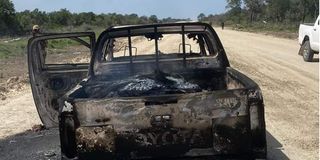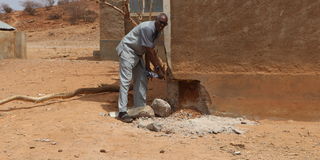
The wreckage of a 14-seater matatu that was hit by a roadside explosive planted by suspected al-Shabaab militants in Mandera in early February last year.
| File | Nation Media GroupCounties
Premium
How North Eastern locals aid al-Shabaab terror group
The recent rise in terrorist attacks in Garissa, Wajir and Mandera counties is fuelled by locals who are working in cahoots with Somalia-based al-Shabaab militants.
This was revealed by North Eastern Regional Coordinator John Otieno, who, during a meeting to review the National Strategy to Counter Violent Extremism in Garissa town on Tuesday (November 7), said terrorism has drivers both from within and outside the region.
“We need to look at the internal factors that are driving terrorist activities in this region and deal with them collectively,” he said.

A lorry that was damaged by an explosive on January 17, 2023, on the Lapsset road in Bura East, Tana River County.
He said the State will continue engaging religious leaders on ways of dealing with radicalisation and challenged local youths to join the fight against terrorism by saying no to radicalisation.
According to Mr Otieno, the al-Shabaab terror group is evolving and better strategies are needed to win the fight. He said the militants are being given information by the local communities.
“We should ask ourselves why we are giving this information to al-Shabaab and why our youths get radicalised,” he said.
The ongoing rains increase terrorist activities by providing vegetative cover for the militants to hide in and making it difficult for security agencies to pursue them.

One of the vehicles burnt in an attack by suspected Al-Shabaab militants on the Lamu-Garissa Lapsset road.
“The terrorists have taken advantage of historical injustices and socioeconomic grievances in this region such as unemployment to radicalise locals and that is why we need politicians on board,” Mr Otieno said. The politicians are needed to generate policies that will create jobs for young people, the official added.
Security agencies, civil society groups, youths, women and religious leaders in the North Eastern region are meeting in Garissa to review strategies by the State to fight terrorism. This comes amid rising cases of abductions, with Garissa bearing the brunt.
At least six people have been reported missing in Garissa County within a month with the latest being the October 30 abduction of Garissa-based businessman Abdirashid Hish Mohamed, who was picked up by people suspected to be police officers.
In response to concerns about the kidnappings, Mr Otieno said police are investigating them.

Mr Shobey Abdirahman, head teacher Libehiya Primary school points at a building damaged by an explosive on October 13, 2022.
“Let our security agencies do their work. If there is anyone suspected of any offence, they will be investigated and prosecuted if found culpable,” Mr Otieno said. At least two victims of abduction in Fafi have since been released by their captors.
Mr Njenga Miiri, the head of prevention and resilience at the National Counter Terrorism Centre (NCTC), said the review was aimed at keeping tabs on the ever-evolving threats posed by terrorism and violent extremism after the 2016 document presented challenges.
He said security agencies had deemed it fit to review the current document by collating and harmonising the views of different actors.

A shell of a lorry burnt by suspected Al-Shabaab militants in Mandera South in a past attack.
“Inclusivity and the multi-agency approach will enable us to improve the document based on our experience in the seven years we have been using it,” he said, adding that the country was determined to address both domestic and transnational terrorism.
The review was financed by The Global Community Engagement and Resilience Fund in partnership with the NCTC and Act Change Transform, a non-governmental organisation.





